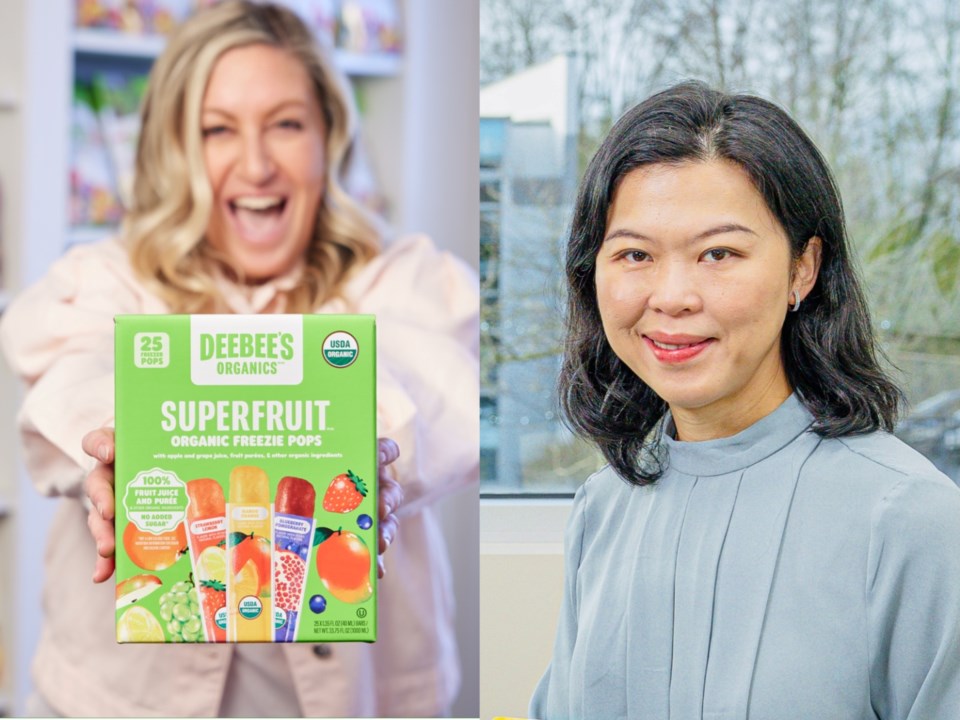A pair of B.C. businesses has been recognized as two of the fastest-growing, women-owned or led companies in North America by a U.S.-based organization that connects and empowers women business leaders.
DeeBee’s Organics Inc. in Victoria and Richmond’s Herbaland Naturals Inc. are among the 50 companies that received the recognition from the Women Presidents Organization (WPO). They’re the only non-U.S. companies on the list this year.
“There's so much that we fight against to break glass ceilings in order to achieve where we are,” said Dionne Laslo-Baker, founder and CEO of DeeBee’s Organics.
“So it's such an honour to be recognized and to be amongst other women who have been able to break through these challenges to come on to the other side.”
Healthy snacks popular among consumers
When many businesses were struggling during the pandemic or still feeling post-pandemic impacts, the two West Coast companies saw their revenue grow exponentially.
Laslo-Baker founded DeeBee’s Organics 10 years ago when she tried to create snacks for her children made of what she described as “pure, organic and clean ingredients.” The company reported a nearly 700 per cent growth in revenue over the past five years.
In 2017, DeeBee’s Organics launched its Superfruit Freezie products – freezie pops that are made of pure fruit juice with zero added sugar or artificial ingredients.
The products, which are also organic, non-GMO certified, vegan, gluten-free and top-nine allergen free, soon became a fast-growing snack among consumers in North America.
“We created a whole grocery category – the freeze-at-home category in the natural organic space. We drive that growth in that category and own close to 80 per cent of that category share in the marketplace,” said Laslo-Baker.
While DeeBee’s Organics makes healthy snacks, Herbaland has drawn a bead on turning nutrients into snacks. Its line of gummy bear supplements containing a range of vitamins is aimed at consumers who often shy away from taking capsules or tablets.
Since Aisha Yang and husband Musharaf Syed launched it in 2009, the company has grown into a leading nutritious gummy brand in Canada and has seen a 522 per cent growth in revenue over the past five years. It also announced plans to expand earlier this year.
Herbaland CEO Yang said businesses owned or led by women come with many advantages.
“When we run the business, we can provide different perspectives to discuss them with the customers, the clients and employees, and that thoughtful part, in my opinion, is really a highlight of the women’s personality,” she said.
Female business owners also tend to hire and promote female employees and create a more inclusive, diverse workplace, said Laslo-Baker, whose company is now majority women-led.
Breaking the unconscious bias
In addition to all the challenges associated with running a business, women entrepreneurs still face stereotyping and unconscious bias in the business world compared to their male counterparts, according to Laslo-Baker.
“I quickly learned that as a female entrepreneur it was really tough to get capital and for people to take me seriously,” she said.
She recalled that in the early days, a potential investor said to her if she gets a man as a CEO, who “really knows his stuff,” maybe he will invest. And another time, some bankers asked her why she was rocking the boat when her husband could provide for the family.
“There's a lot of unconscious bias. It's still a world dominated by men and men realize that as well. … We face these things all the time, and they just put this doubt in our mind where we have a perpetual impostor syndrome,” said Laslo-Baker.
Yang has also experienced challenges imposed on women entrepreneurs.
“As a woman, especially me as an immigrant, woman of colour, sometimes … they don’t take you seriously and don’t recognize that you are a true leader,” said Yang.
“I think for women, they need to be fully aware that there are some stereotypes that they cannot change, but you can find a way to prove yourself.”
Yang said her solution was to use the strong performance of her business to showcase her capability and innovation and win recognition in the industry, although it takes time.
“I don't see myself, whatever I do, whatever I contribute, having any difference between men and woman … My advice is don’t think you are different and set any limitations. Just do whatever you can. You can be outstanding,” she said.
For Laslo-Baker, it’s important to be surrounded by people she can trust and admire, and who don't have an attitude.
“Groups like WPO and other kinds of female founder groups that created the support network are incredible. … Make sure that you connect with people and don't be scared to reach out to somebody,” she said.
“And being able to share our stories with other people makes other female founders in the beginning stages feel like they can do it themselves because they see a role model that is more similar to themselves.”



